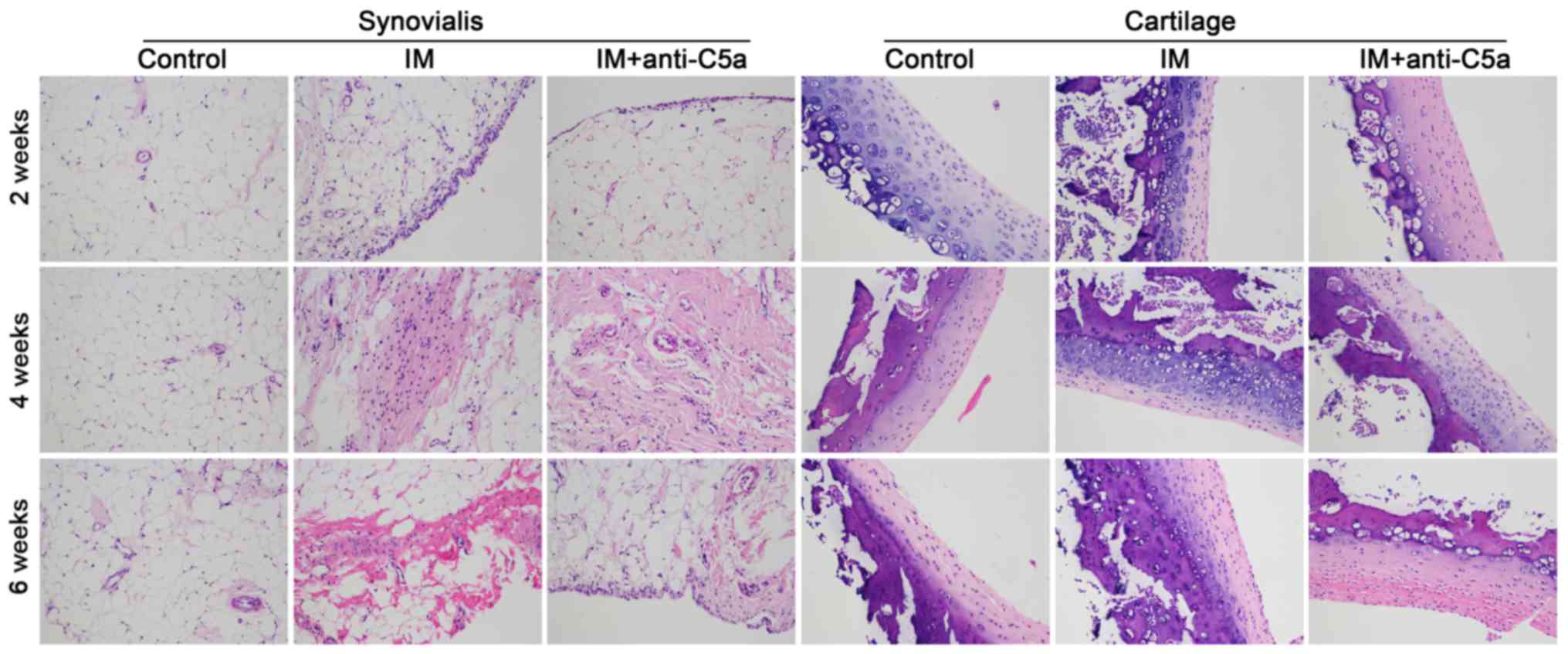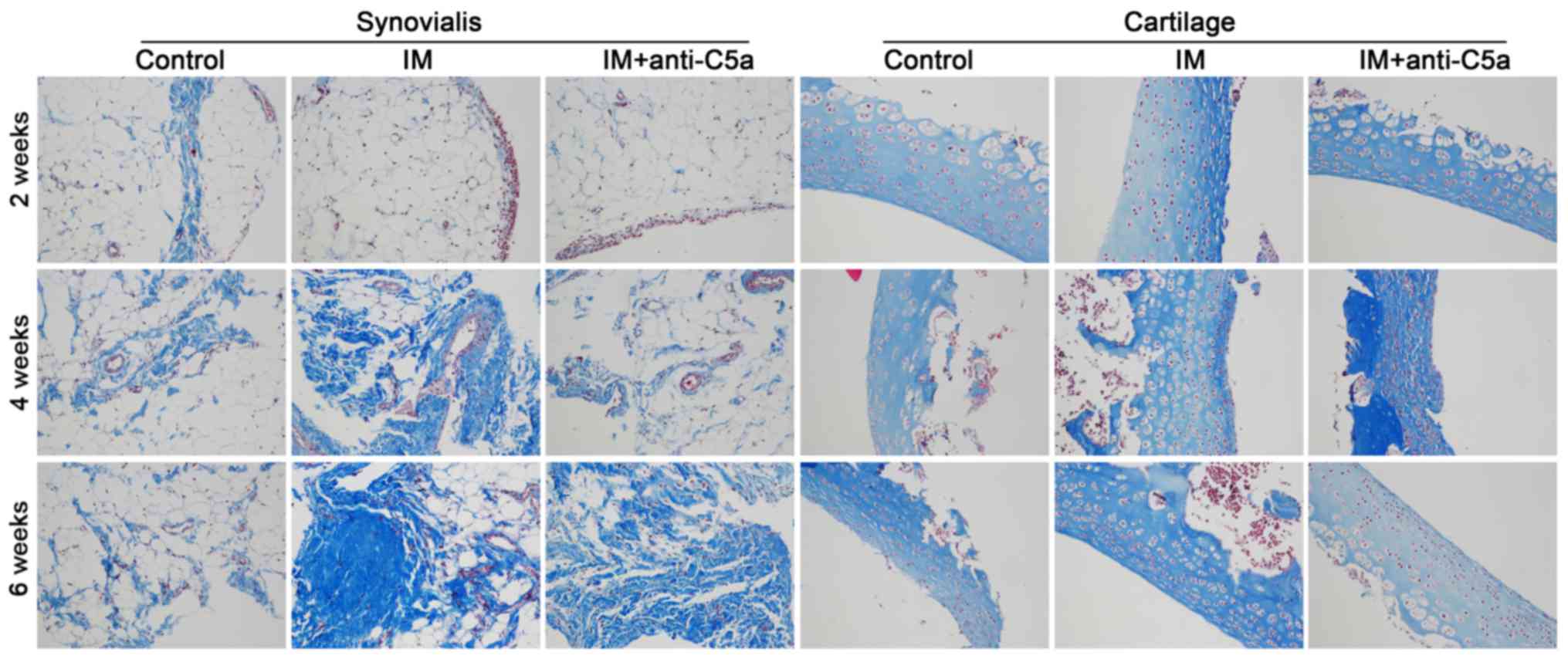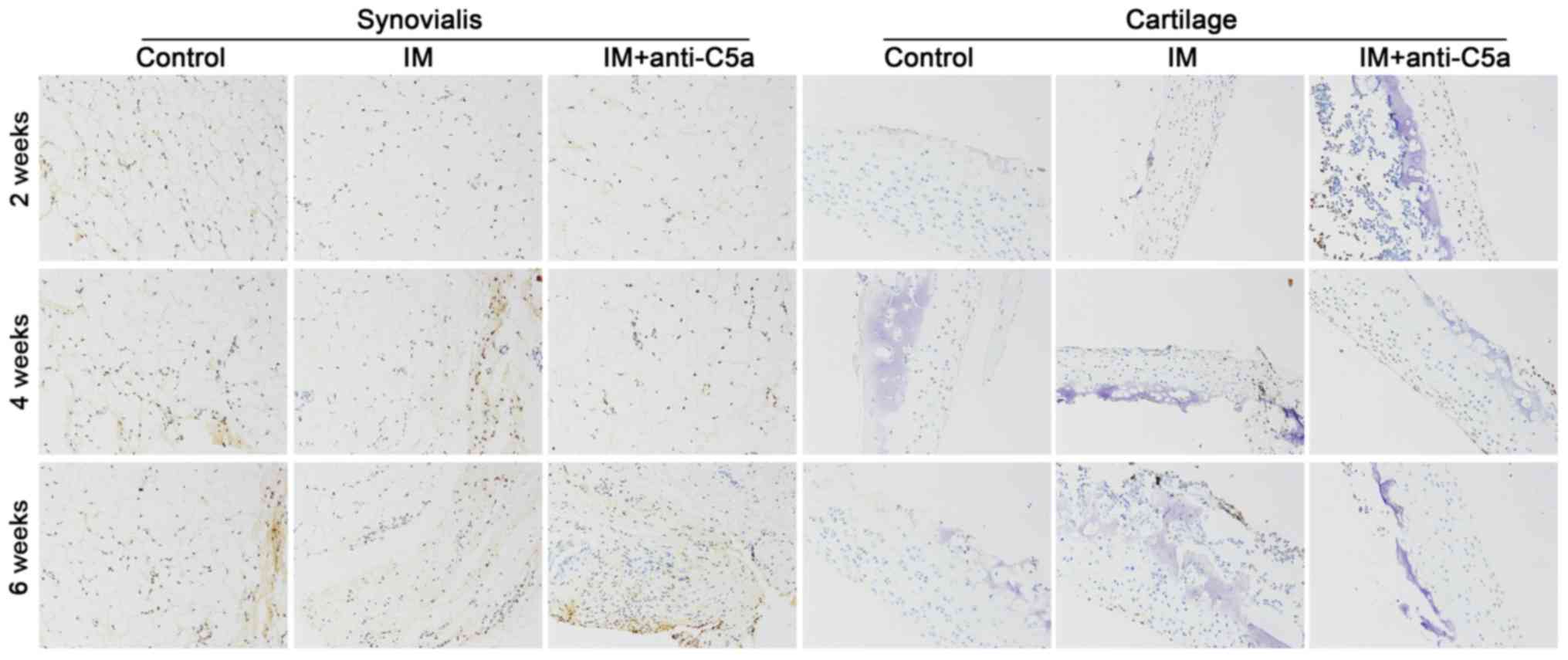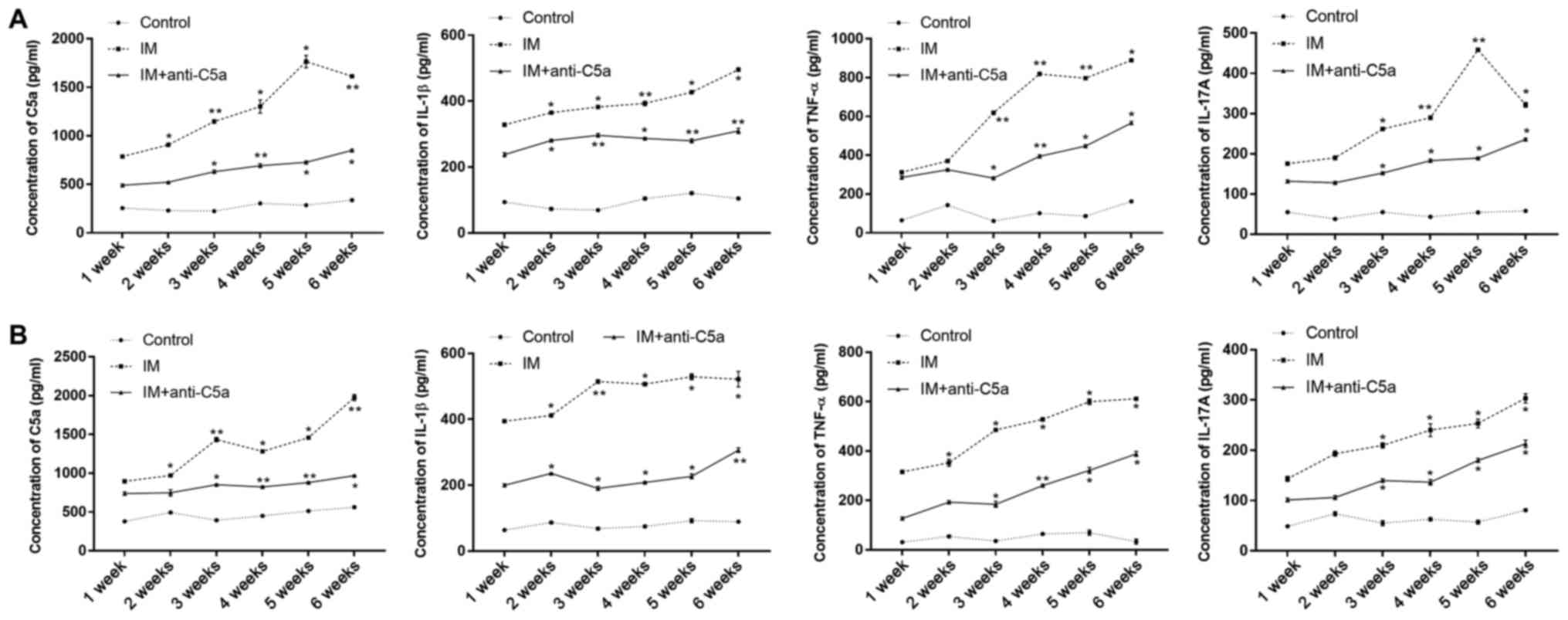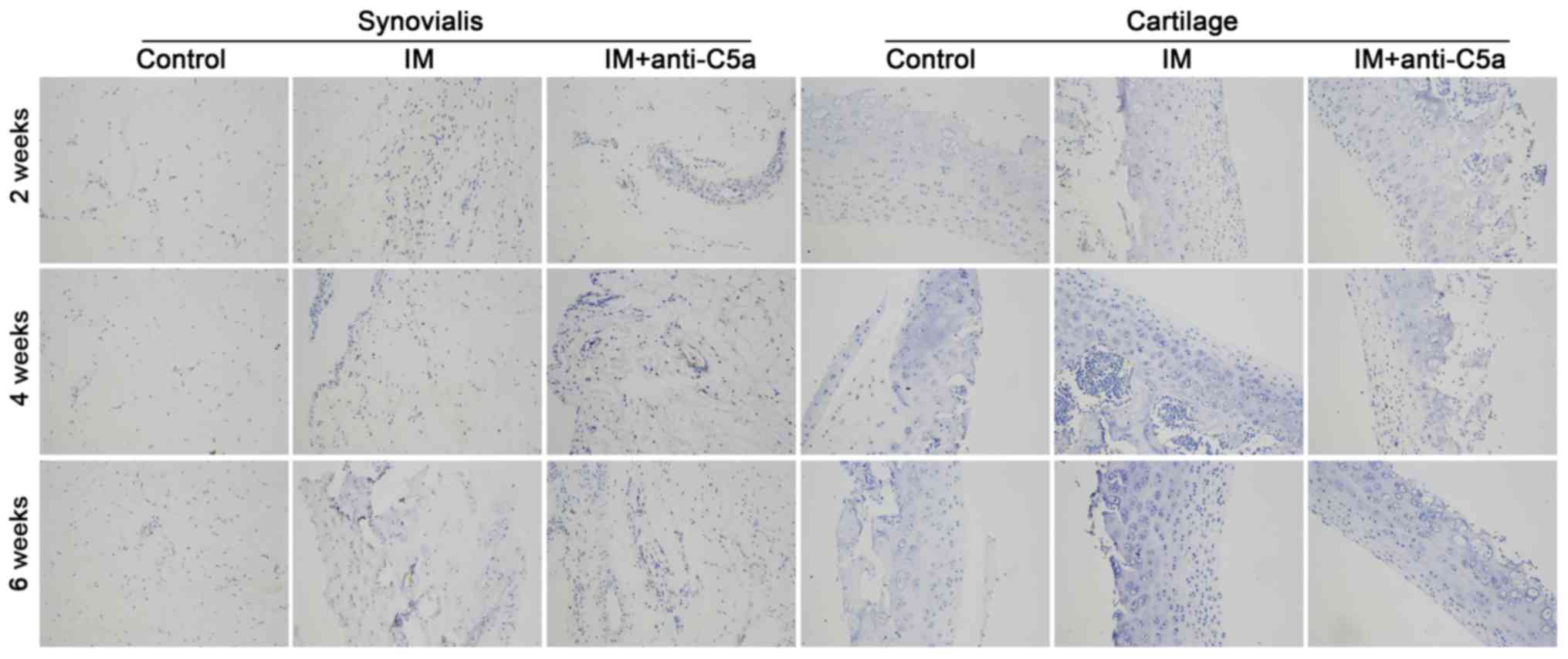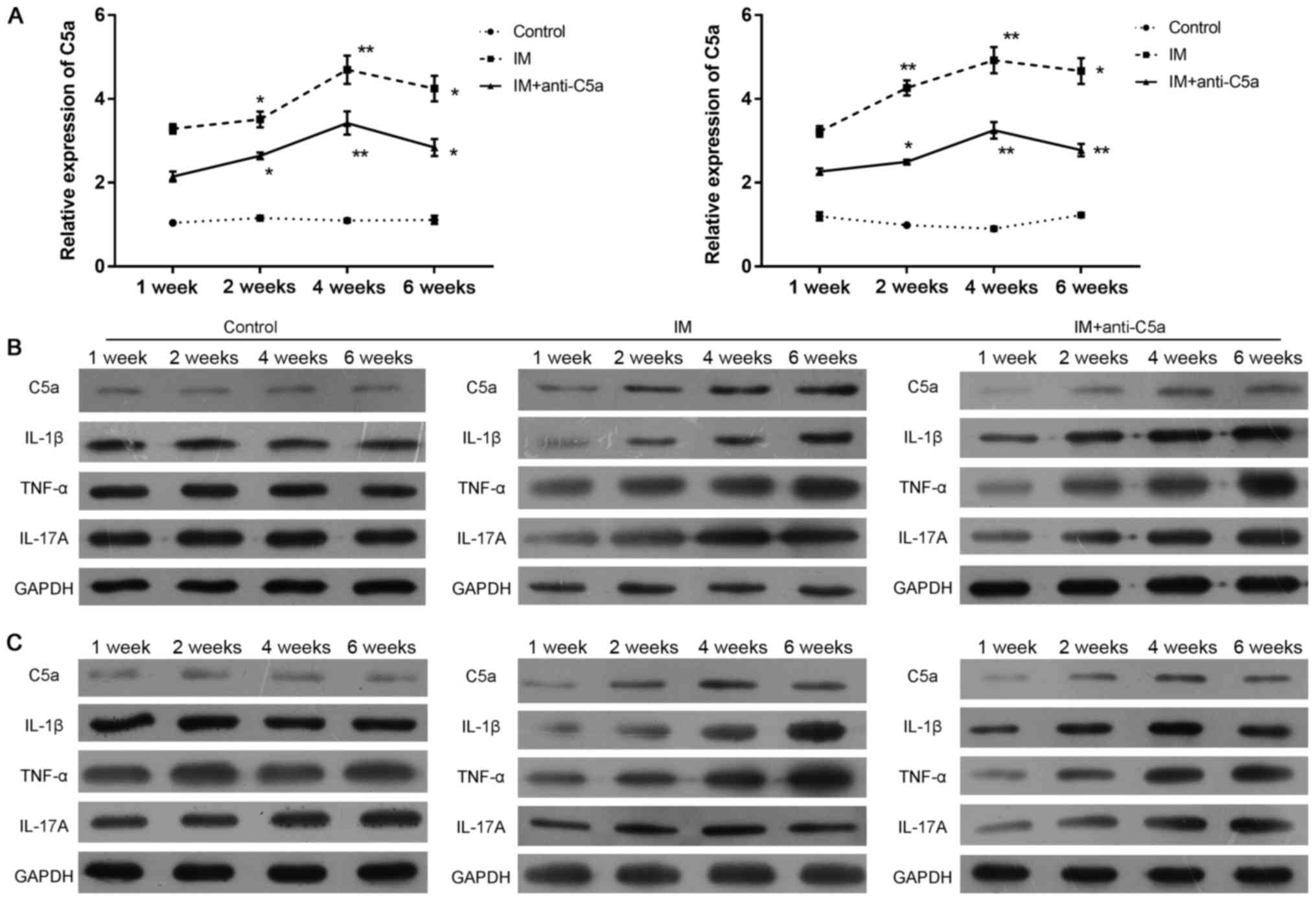|
1
|
Behrens F, Kraft EL and Oegema TR Jr:
Biochemical changes in articular cartilage after joint
immobilization by casting or external fixation. J Orthop Res.
7:335–343. 1989. View Article : Google Scholar : PubMed/NCBI
|
|
2
|
Tammi M, Säämänen AM, Jauhiainen A,
Malminen O, Kiviranta I and Helminen H: Proteoglycan alterations in
rabbit knee articular cartilage following physical exercise and
immobilization. Connect Tissue Res. 11:45–55. 1983. View Article : Google Scholar : PubMed/NCBI
|
|
3
|
Tammi M, Kiviranta I, Peltonen L, Jurvelin
J and Helminen HJ: Effects of joint loading on articular cartilage
collagen metabolism: Assay of procollagen prolyl 4-hydroxylase and
galactosylhydroxylysyl glucosyltransferase. Connect Tissue Res.
17:199–206. 1988. View Article : Google Scholar : PubMed/NCBI
|
|
4
|
Videman T, Eronen I and Candolin T:
[3H]proline incorporation and hydroxyproline concentration in
articular cartilage during the development of osteoarthritis caused
by immobilization. A study in vivo with rabbits. Biochem J.
200:435–440. 1981. View Article : Google Scholar : PubMed/NCBI
|
|
5
|
Jurvelin J, Kiviranta I, Säämänen AM,
Tammi M and Helminen HJ: Partial restoration of
immobilization-induced softening of canine articular cartilage
after remobilization of the knee (stifle) joint. J Orthop Res.
7:352–358. 1989. View Article : Google Scholar : PubMed/NCBI
|
|
6
|
Haapala J, Arokoski JP, Hyttinen MM, Lammi
M, Tammi M, Kovanen V, Helminen HJ and Kiviranta I: Remobilization
does not fully restore immobilization induced articular cartilage
atrophy. Clin Orthop Relat Res. 218–229. 1999.PubMed/NCBI
|
|
7
|
Jortikka MO, Inkinen RI, Tammi MI,
Parkkinen JJ, Haapala J, Kiviranta I, Helminen HJ and Lammi MJ:
Immobilisation causes longlasting matrix changes both in the
immobilised and contralateral joint cartilage. Ann Rheum Dis.
56:255–261. 1997. View Article : Google Scholar : PubMed/NCBI
|
|
8
|
Vanwanseele B, Eckstein F, Knecht H,
Stussi E and Spaepen A: Knee cartilage of spinal cord-injured
patients displays progressive thinning in the absence of normal
joint loading and movement. Arthritis Rheum. 46:2073–2078. 2002.
View Article : Google Scholar : PubMed/NCBI
|
|
9
|
Hagiwara Y, Ando A, Chimoto E, Saijo Y,
Ohmori-Matsuda K and Itoi E: Changes of articular cartilage after
immobilization in a rat knee contracture model. J Orthop Res.
27:236–242. 2009. View Article : Google Scholar : PubMed/NCBI
|
|
10
|
Pritzker KP: Animal models for
osteoarthritis: Processes, problems and prospects. Ann Rheum Dis.
53:406–420. 1994. View Article : Google Scholar : PubMed/NCBI
|
|
11
|
Wong K, Sun F, Trudel G, Sebastiani P and
Laneuville O: Temporal gene expression profiling of the rat knee
joint capsule during immobilization-induced joint contractures. BMC
Musculoskelet Disord. 16:1252015. View Article : Google Scholar : PubMed/NCBI
|
|
12
|
Misra D, Felson DT, Silliman RA, Nevitt M,
Lewis CE, Torner J and Neogi T: Knee osteoarthritis and frailty:
Findings from the Multicenter Osteoarthritis Study and
Osteoarthritis Initiative. J Gerontol A Biol Sci Med Sci.
70:339–344. 2015. View Article : Google Scholar : PubMed/NCBI
|
|
13
|
Goldring MB and Goldring SR: Articular
cartilage and subchondral bone in the pathogenesis of
osteoarthritis. Ann N Y Acad Sci. 1192:230–237. 2010. View Article : Google Scholar : PubMed/NCBI
|
|
14
|
Haseeb A and Haqqi TM: Immunopathogenesis
of osteoarthritis. Clin Immunol. 146:185–196. 2013. View Article : Google Scholar : PubMed/NCBI
|
|
15
|
Berenbaum F: Osteoarthritis as an
inflammatory disease (osteoarthritis is not osteoarthrosis!).
Osteoarthritis Cartilage. 21:16–21. 2013. View Article : Google Scholar : PubMed/NCBI
|
|
16
|
Liu-Bryan R: Synovium and the innate
inflammatory network in osteoarthritis progression. Curr Rheumatol
Rep. 15:3232013. View Article : Google Scholar : PubMed/NCBI
|
|
17
|
Nishiura H: The alternative C5a receptor
function. Adv Exp Med Biol. 735:111–121. 2013. View Article : Google Scholar : PubMed/NCBI
|
|
18
|
Woodruff TM, Nandakumar KS and Tedesco F:
Inhibiting the C5-C5a receptor axis. Mol Immunol. 48:1631–1642.
2011. View Article : Google Scholar : PubMed/NCBI
|
|
19
|
Yuan G, Wei J, Zhou J, Hu H, Tang Z and
Zhang G: Expression of C5aR (CD88) of synoviocytes isolated from
patients with rheumatoid arthritis and osteoarthritis. Chin Med J
(Engl). 116:1408–1412. 2003.PubMed/NCBI
|
|
20
|
Pujol JP and Loyau G: Interleukin-1 and
osteoarthritis. Life Sci. 41:1187–1198. 1987. View Article : Google Scholar : PubMed/NCBI
|
|
21
|
National Institute of Allergy and
Infectious Diseases NIoH. Bethesda, Md: National Institutes of
Health (1996) Guide for the care and use of laboratory animals;
|
|
22
|
Livak KJ and Schmittgen TD: Analysis of
relative gene expression data using real-time quantitative PCR and
the 2(-Delta Delta C(T)) method. Methods. 25:402–408. 2001.
View Article : Google Scholar : PubMed/NCBI
|
|
23
|
Ponchel F, Burska AN, Hensor EM, Raja R,
Campbell M, Emery P and Conaghan PG: Changes in peripheral blood
immune cell composition in osteoarthritis. Osteoarthritis
Cartilage. 23:1870–1878. 2015. View Article : Google Scholar : PubMed/NCBI
|
|
24
|
Nykula TD, Bychkov OA and Bychkova NH: The
dynamics of indices of immune and cytokine status for patients with
essential hypertension in combination with osteoarthritis. Lik
Sprava. 90–93. 2013.(In Ukrainian). PubMed/NCBI
|
|
25
|
Kandahari AM, Yang X, Dighe AS, Pan D and
Cui Q: Recognition of immune response for the early diagnosis and
treatment of osteoarthritis. J Immunol Res. 2015:1924152015.
View Article : Google Scholar : PubMed/NCBI
|
|
26
|
de Lange-Brokaar BJ, Ioan-Facsinay A, van
Osch GJ, Zuurmond AM, Schoones J, Toes RE, Huizinga TW and
Kloppenburg M: Synovial inflammation, immune cells and their
cytokines in osteoarthritis: A review. Osteoarthritis Cartilage.
20:1484–1499. 2012. View Article : Google Scholar : PubMed/NCBI
|
|
27
|
Wang Q, Rozelle AL, Lepus CM, Scanzello
CR, Song JJ, Larsen DM, Crish JF, Bebek G, Ritter SY, Lindstrom TM,
et al: Identification of a central role for complement in
osteoarthritis. Nat Med. 17:1674–1679. 2011. View Article : Google Scholar : PubMed/NCBI
|
|
28
|
Buckland J: Osteoarthritis:
Complement-mediated inflammation in OA progression. Nat Rev
Rheumatol. 8:22011. View Article : Google Scholar : PubMed/NCBI
|
|
29
|
Liu-Bryan R and Terkeltaub R: Emerging
regulators of the inflammatory process in osteoarthritis. Nat Rev
Rheumatol. 11:35–44. 2015. View Article : Google Scholar : PubMed/NCBI
|
|
30
|
Struglics A, Okroj M, Swärd P, Frobell R,
Saxne T, Lohmander LS and Blom AM: The complement system is
activated in synovial fluid from subjects with knee injury and from
patients with osteoarthritis. Arthritis Res Ther. 18:2232016.
View Article : Google Scholar : PubMed/NCBI
|
|
31
|
Wang X, Hunter D, Xu J and Ding C:
Metabolic triggered inflammation in osteoarthritis. Osteoarthritis
Cartilage. 23:22–30. 2015. View Article : Google Scholar : PubMed/NCBI
|
|
32
|
Kuna P, Reddigari SR, Schall TJ, Rucinski
D, Sadick M and Kaplan AP: Characterization of the human basophil
response to cytokines, growth factors, and histamine releasing
factors of the intercrine/chemokine family. J Immunol.
150:1932–1943. 1993.PubMed/NCBI
|
|
33
|
Stone SF, Isbister GK, Shahmy S, Mohamed
F, Abeysinghe C, Karunathilake H, Ariaratnam A, Jacoby-Alner TE,
Cotterell CL and Brown SG: Immune response to snake envenoming and
treatment with antivenom; complement activation, cytokine
production and mast cell degranulation. PLoS Negl Trop Dis.
7:e23262013. View Article : Google Scholar : PubMed/NCBI
|
|
34
|
Michel O, Ginanni R, Le Bon B, Content J,
Duchateau J and Sergysels R: Inflammatory response to acute
inhalation of endotoxin in asthmatic patients. Am Rev Respir Dis.
146:352–357. 1992. View Article : Google Scholar : PubMed/NCBI
|
|
35
|
Cavaillon JM, Fitting C and
Haeffner-Cavaillon N: Recombinant C5a enhances interleukin 1 and
tumor necrosis factor release by lipopolysaccharide-stimulated
monocytes and macrophages. Eur J Immunol. 20:253–257. 1990.
View Article : Google Scholar : PubMed/NCBI
|
|
36
|
Kiviranta I, Tammi M, Jurvelin J, Arokoski
J, Saamanen AM and Helminen HJ: Articular cartilage thickness and
glycosaminoglycan distribution in the young canine knee joint after
remobilization of the immobilized limb. J Orthop Res. 12:161–167.
1994. View Article : Google Scholar : PubMed/NCBI
|
|
37
|
Maldonado DC, Silva MC, Neto Sel-R, de
Souza MR and de Souza RR: The effects of joint immobilization on
articular cartilage of the knee in previously exercised rats. J
Anat. 222:518–525. 2013. View Article : Google Scholar : PubMed/NCBI
|
|
38
|
Nomura M, Sakitani N, Iwasawa H, Kohara Y,
Takano S, Wakimoto Y, Kuroki H and Moriyama H: Thinning of
articular cartilage after joint unloading or immobilization. An
experimental investigation of the pathogenesis in mice.
Osteoarthritis Cartilage. 25:727–736. 2017. View Article : Google Scholar : PubMed/NCBI
|
|
39
|
Müller FJ, Setton LA, Manicourt DH, Mow
VC, Howell DS and Pita JC: Centrifugal and biochemical comparison
of proteoglycan aggregates from articular cartilage in experimental
joint disuse and joint instability. J Orthop Res. 12:498–508. 1994.
View Article : Google Scholar : PubMed/NCBI
|















